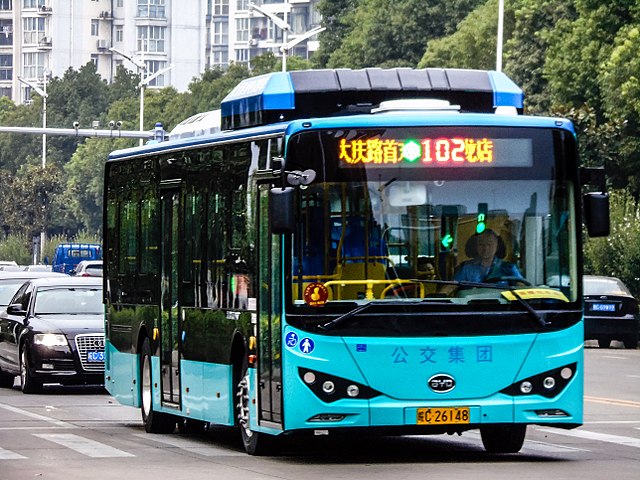China's Electric Vehicle Push: Shaping The Future Of Transportation

Table of Contents
Government Policies and Incentives Driving EV Adoption
The Chinese government's proactive policies are a cornerstone of the country's EV success. Substantial government subsidies, attractive tax breaks, and stringent regulations have significantly accelerated EV sales and market penetration. These measures have created a favorable environment for both consumers and manufacturers to embrace electric mobility.
- New Energy Vehicle (NEV) Quotas: Mandating a certain percentage of NEV sales for automakers has forced traditional manufacturers to invest heavily in EV development and production. This policy has been instrumental in driving innovation and increasing the availability of EVs in the market.
- Subsidies and Tax Incentives: Generous government subsidies have made EVs significantly more affordable for consumers, bridging the price gap with gasoline-powered vehicles. These incentives have proven highly effective in boosting consumer demand.
- Restrictions on Internal Combustion Engine (ICE) Vehicles: Increasing restrictions on ICE vehicles, including limitations on vehicle registration in major cities, further incentivize the adoption of EVs. This policy has contributed to improved air quality in urban areas.
- Effectiveness of Incentive Schemes: While the effectiveness of different incentive schemes is constantly evaluated and adjusted, the overall impact has been undeniable in propelling China's EV market to the forefront globally.
Technological Advancements and Innovation in the Chinese EV Sector
China's EV sector isn't just about government support; it's fueled by significant technological advancements. The country has made impressive strides in battery technology, charging infrastructure, and autonomous driving systems.
- Battery Advancements: China is a global leader in lithium-ion battery production, constantly improving battery energy density, lifespan, and charging speeds. Research and development into solid-state batteries hold the potential for even greater advancements in the future.
- Charging Network Expansion: The rapid expansion of charging stations, particularly fast-charging stations, across major cities and highways, is addressing range anxiety, a key barrier to EV adoption. The government is actively promoting standardization of charging technologies.
- Autonomous Driving Technology: Chinese companies are making significant progress in developing and integrating autonomous driving technology into EVs. This technology promises to further enhance the appeal and usability of electric vehicles.
- Key Chinese EV Technology Companies: Companies like CATL (Contemporary Amperex Technology Co. Limited), a leading battery manufacturer, and numerous other innovative technology firms are driving advancements across the entire EV ecosystem.
The Rise of Domestic EV Manufacturers
The success of China's EV push is inextricably linked to the rise of homegrown EV brands. Companies like BYD, NIO, and Xpeng have not only captured significant market share domestically but are also expanding globally.
- Market Share Dominance: BYD, in particular, holds a commanding market share in China’s EV market, showcasing the competitiveness and rapid growth of domestic brands.
- Competitive Advantages: These companies often offer competitive pricing, advanced features, and innovative designs, appealing to a wide range of consumers.
- International Expansion: NIO and Xpeng are actively expanding into international markets, demonstrating the increasing global reach of Chinese EV manufacturers.
- Successful EV Models: Models like BYD's Han and Tang, and NIO's ET7 and ES8, are examples of successful EV models that combine advanced technology with appealing designs.
Infrastructure Development: Building a Nationwide Charging Network
The widespread adoption of EVs hinges on the availability of a robust charging infrastructure. China is making significant investments in expanding its charging network, addressing a critical aspect of EV accessibility.
- Expansion of Charging Stations: A massive expansion of charging stations is underway, with installations occurring across cities and along major highways.
- Standardization Initiatives: Government initiatives are focused on standardizing charging technologies, ensuring interoperability and convenience for EV users.
- Fast-Charging and Battery-Swapping: Investment in fast-charging technologies and battery-swapping solutions is accelerating, aiming to further alleviate range anxiety.
- Challenges in Nationwide Coverage: Despite significant progress, challenges remain in ensuring truly nationwide coverage, particularly in remote areas.
The Global Impact of China's EV Push
China's EV revolution is not confined to its borders; it's having a profound impact on the global automotive industry.
- Global Battery Supply Chains: China's dominance in battery production is reshaping global supply chains, influencing the availability and pricing of batteries worldwide.
- Global Competition: Chinese EV manufacturers are posing a significant challenge to established international automakers, increasing competition and driving innovation in the global EV market.
- Setting Global Standards: China's influence is extending to the setting of global EV standards, impacting technological development and regulatory frameworks internationally.
- Technological Spillover Effects: The technological advancements emerging from China's EV push are likely to have spillover effects, benefiting the global EV industry as a whole.
Conclusion
China's aggressive push towards electric vehicles is reshaping the global automotive industry. Government support, technological innovation, and the rise of competitive domestic manufacturers are driving rapid growth, promising a future dominated by sustainable transportation. The continued development of a comprehensive charging infrastructure is essential to ensuring the long-term success of this transformative initiative. Understanding China's electric vehicle push is crucial for navigating the future of the automotive sector and sustainable transportation. Learn more about the latest advancements in China's electric vehicle push and its global implications.

Featured Posts
-
 Saabs Ceo On Reduced Delivery Times For Defense Projects
Apr 26, 2025
Saabs Ceo On Reduced Delivery Times For Defense Projects
Apr 26, 2025 -
 Blue Origin Scraps Rocket Launch Due To Vehicle Subsystem Problem
Apr 26, 2025
Blue Origin Scraps Rocket Launch Due To Vehicle Subsystem Problem
Apr 26, 2025 -
 Over The Counter Birth Control Implications For Reproductive Healthcare After Roe V Wade
Apr 26, 2025
Over The Counter Birth Control Implications For Reproductive Healthcare After Roe V Wade
Apr 26, 2025 -
 Damen And Icdas Partner To Construct Tugboat In Turkey
Apr 26, 2025
Damen And Icdas Partner To Construct Tugboat In Turkey
Apr 26, 2025 -
 Quem E Benson Boone Biografia Do Cantor De Beautiful Thing E Do Lollapalooza
Apr 26, 2025
Quem E Benson Boone Biografia Do Cantor De Beautiful Thing E Do Lollapalooza
Apr 26, 2025
